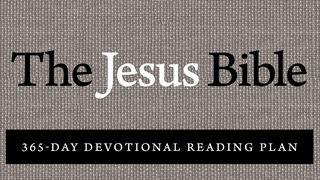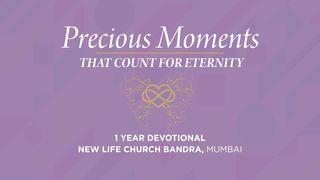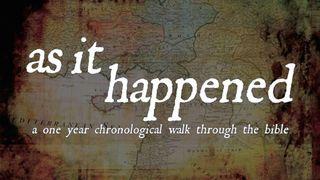For The Love Of GodSample

THERE IS IMPORTANT COMMON GROUND IN Micah 6 and Luke 15. Yet I shall approach it obliquely.
One of the slogans of the Reformation was simul justus et peccator, a Latin phrase meaning something like “simultaneously just[ified] and a sinner.” It was a way of getting at the legal nature of justification as expounded by Paul. On the ground of Christ’s death, God declares guilty sinners just—not because, from the act of justification itself, they are in their actions and thoughts truly just or righteous, but because they have been acquitted before the bar of God’s justice. Because Christ has paid their penalty, they are just in God’s eyes, even though, at the level of their very being, they are sinners still. Nevertheless, the Reformers never argued that justification stands by itself. Justification is part of salvation, but it is not all of it. The Holy Spirit brings conviction of sin and regeneration; the ultimate step is the final transformation of God’s people in body and spirit at the last day. These elements and more belong together, and all who are truly saved ultimately experience all of them. So while justification in and of itself leaves a person a sinner still, justification never operates all by itself. Genuine salvation not only forgives us but transforms us.
Micah understands this. He does not so much deal with the ground of Israel’s acceptance before God (which is finally tied to God’s grace, Deut. 9) as insist that, if the covenantal relationship with God is genuine, it will not be soaked in idolatry, syncretism, and injustice. So how shall I come before the Lord? Shall I sacrifice the prescribed yearling? (Micah 6:6). How about thousands of rams? Or how about sacrificing my own son: will that pay “for the sin of my soul” (Micah 6:7)? What the Lord requires is this: “To act justly and to love mercy and to walk humbly with your God” (Micah 6:8).
Micah is not alone on this point, of course. Jesus preached something similar, quoting Hosea (Matt. 9:13). Paul insists that the wicked will not inherit the kingdom of God (1 Cor. 6:9-11). He does not mean that only the perennial goody-goody will make it, for he goes on to say that some of his readers once practiced astonishing evil. But if they have been truly saved, transformation must manifest itself. That is equally true in the parable of the lost son (Luke 15:11-27). He is received by the father’s grace. Yet in the complexity of the return, the son abandons his sin even as he casts himself on his father’s mercy. As critically important as simul justus et peccator is, it must never, never be used to justify the practice of sin.
One of the slogans of the Reformation was simul justus et peccator, a Latin phrase meaning something like “simultaneously just[ified] and a sinner.” It was a way of getting at the legal nature of justification as expounded by Paul. On the ground of Christ’s death, God declares guilty sinners just—not because, from the act of justification itself, they are in their actions and thoughts truly just or righteous, but because they have been acquitted before the bar of God’s justice. Because Christ has paid their penalty, they are just in God’s eyes, even though, at the level of their very being, they are sinners still. Nevertheless, the Reformers never argued that justification stands by itself. Justification is part of salvation, but it is not all of it. The Holy Spirit brings conviction of sin and regeneration; the ultimate step is the final transformation of God’s people in body and spirit at the last day. These elements and more belong together, and all who are truly saved ultimately experience all of them. So while justification in and of itself leaves a person a sinner still, justification never operates all by itself. Genuine salvation not only forgives us but transforms us.
Micah understands this. He does not so much deal with the ground of Israel’s acceptance before God (which is finally tied to God’s grace, Deut. 9) as insist that, if the covenantal relationship with God is genuine, it will not be soaked in idolatry, syncretism, and injustice. So how shall I come before the Lord? Shall I sacrifice the prescribed yearling? (Micah 6:6). How about thousands of rams? Or how about sacrificing my own son: will that pay “for the sin of my soul” (Micah 6:7)? What the Lord requires is this: “To act justly and to love mercy and to walk humbly with your God” (Micah 6:8).
Micah is not alone on this point, of course. Jesus preached something similar, quoting Hosea (Matt. 9:13). Paul insists that the wicked will not inherit the kingdom of God (1 Cor. 6:9-11). He does not mean that only the perennial goody-goody will make it, for he goes on to say that some of his readers once practiced astonishing evil. But if they have been truly saved, transformation must manifest itself. That is equally true in the parable of the lost son (Luke 15:11-27). He is received by the father’s grace. Yet in the complexity of the return, the son abandons his sin even as he casts himself on his father’s mercy. As critically important as simul justus et peccator is, it must never, never be used to justify the practice of sin.
About this Plan

A daily devotional for discovering the riches of God's word: For the Love of God is a daily devotional designed to walk a person through the Bible in a year while assisting the reader in discovering the riches of God's Word. Our hope is that this daily devotional will deepen your understanding and appreciation of God's Word, for the love of God.
More
We would like to thank The Gospel Coalition for providing this plan. For more information, please visit: thegospelcoalition.org









